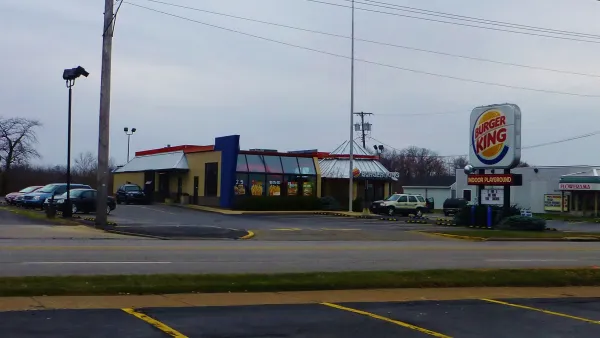Though cities like Los Angeles have established moratoriums on the construction of new fast food residents in an effort to tackle obesity, a new study questions the importance of place-based causes and solutions.
"In a new study, researchers from the University of North Carolina led by nutrition professor Barry Popkin have found that even when they are not eating at fast-food restaurants, children who frequent them tend to eat food that would probably make many of them overweight or obese anyway," reports Melissa Healy. "The authors of the latest research combed through a national database of Americans' health and nutrition behaviors and grouped 4,466 American kids--from ages 2 to 18--according to what they ate when they were not eating food purchased at a fast-food restaurant."
"'Our findings suggest that the location where foods are obtained may not be as important as the nutritional quality of the foods consumed,' the authors wrote. They also suggest that 'the effect of public health efforts targeted at fast food restaurants may also be overestimated, such that these efforts may be necessary but not sufficient to reduce child obesity if the remainder of the diet is not addressed.'"
FULL STORY: Fast food isn't making our kids fat. It's the rest of their diet.

National Parks Layoffs Will Cause Communities to Lose Billions
Thousands of essential park workers were laid off this week, just before the busy spring break season.

Retro-silient?: America’s First “Eco-burb,” The Woodlands Turns 50
A master-planned community north of Houston offers lessons on green infrastructure and resilient design, but falls short of its founder’s lofty affordability and walkability goals.

Delivering for America Plan Will Downgrade Mail Service in at Least 49.5 Percent of Zip Codes
Republican and Democrat lawmakers criticize the plan for its disproportionate negative impact on rural communities.

Test News Post 1
This is a summary

Test News Headline 46
Test for the image on the front page.

Balancing Bombs and Butterflies: How the National Guard Protects a Rare Species
The National Guard at Fort Indiantown Gap uses GIS technology and land management strategies to balance military training with conservation efforts, ensuring the survival of the rare eastern regal fritillary butterfly.
Urban Design for Planners 1: Software Tools
This six-course series explores essential urban design concepts using open source software and equips planners with the tools they need to participate fully in the urban design process.
Planning for Universal Design
Learn the tools for implementing Universal Design in planning regulations.
EMC Planning Group, Inc.
Planetizen
Planetizen
Mpact (formerly Rail~Volution)
Great Falls Development Authority, Inc.
HUDs Office of Policy Development and Research
NYU Wagner Graduate School of Public Service



























